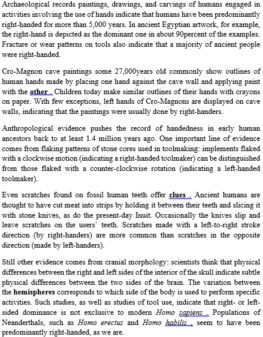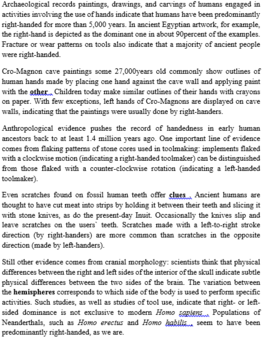Read the following passage and mark the letter A, B, C, or D on your answer sheet to indicate the correct answer to each of the questions.
One of the most urgent environmental problems in the world today is the shortage of clean water. Having clean drinking water is a basic human right. However, acid rain, industrial pollution and garbage have made many sources of water undrinkable.
Lakes, reservoirs and even entire seas have become vast pools of poison. Lake Baikal in Russia is one of the largest lakes in the world. It contains a rich variety of animals and plants, including 1,300 rare species that do not exist anywhere else in the world. Yet, they are being destroyed by the massive volumes of industrial effluent which pour into the lake every day. Even though laws have been made, the governments do not have the power to enforce them. Most industries simply ignore the regulations. The Mediterranean Sea occupies 1% of the world's water surface, but it is the dumping ground for 50% of all marine pollution. Almost sixteen countries regularly throw industrial wastes a few miles offshore.
Water is free to everyone. A few years ago people thought that the supply of clean water in the world was limitless. Today, many water supplies have been ruined by pollution and sewage. Clean water is now scarce, and we are at last beginning to respect it. What should we do to save this precious source?
19. What is the main idea of the reading text?
A. People are throwing poisons into bodies of water.
B. Clean water is becoming scarce due to pollution and sewage.
C. Laws have been made to prevent countries from polluting the environment.
D. Sea water is increasingly polluted by industrial wastes.
20. According to the reading text, Lake Baikal ________.
A. is the smallest lake in Russia
B. has 1,300 rare and endangered animals
C. is located in the Mediterranean Sea
D. gets a large amount of industrial sewage every day
21. What does the word "them" in the passage refer to?
A. plants B. governments C. laws D. animals
22. The word "marine" is closest in meaning to ________.
A. underground B. mountainous C. inland D. aquatic
Mark letter A, B, C or D on your answer sheet to indicate the sentence that is closest in meaning to the original sentence in each of the following questions.
23. Billionaire Pham Nhat Vuong founded Vinfast Automobile Company in 2017.
A. Vinfast Automobile Company is founded by billionaire Pham Nhat Vuong in 2017.
B. Vinfast Automobile Company was founded by billionaire Pham Nhat Vuong in 2017.
C. Vinfast Automobile Company were founded by billionaire Pham Nhat Vuong in 2017.
D. Vinfast Automobile Company has been founded by billionaire Pham Nhat Vuong in 2017.
24. "I am working for an international bank in Hanoi now," my brother said.
A. My brother said (that) he was working for an international bank in Hanoi then.
B. My brother said (that) he was working for an international bank in Hanoi now.
C. My brother said (that) he was working for an international bank in Hanoi at this time.
D. My brother said (that) he was working for an international bank in Hanoi.
25. If you don’t follow the guidelines from The Ministry of Health, you may be affected by Covid-19.
A. Unless you don’t follow guidelines from The Ministry of Health, you may be affected by Covid-19.
B. Unless you followed guidelines from The Ministry of Health, you may be affected by Covid-19.
C. Unless you follow guidelines from The Ministry of Health, you may not be affected by Covid-19.
D. Unless you follow guidelines from The Ministry of Health, you may be affected by Covid-19.
26. The last time we met Nguyen Quang Hai football player was two months ago.
A. We have met Nguyen Quang Hai football player for two months.
B. We haven’t met Nguyen Quang Hai football player since two months.
C. We haven’t met Nguyen Quang Hai football player for two months.
D. We haven’t met Nguyen Quang Hai football player for two months ago.
27. Jenifer is more intelligent than all the other students in my class.
A. No student in my class is as intelligent as Jenifer is.
B. No student in my class isn’t as intelligent as Jenifer is.
C. No student in my class is as intelligent than Jenifer is.
D. No student in my class is more intelligent as Jenifer is.
28. My sister failed the exam because she was lazy.
A. Because my sister’s laziness, she failed the exam.
B. Because of my sister’s laziness, she failed the exam.
C. Because of my sister was lazy, she failed the exam.
D. Because of my sister laziness, she failed the exam.
29. “What is your name?” Mary asked Tom.
A. Mary asked Tom what his name is.
B. Mary asked Tom what his name was.
C. Mary asked Tom what his name were.
D. Mary asked Tom what your name was.
30. Jack can’t tell you about that sight because he doesn’t see it.
A. If Jack saw that sight, he couldn’t tell you about it.
B. If Jack didn’t see that sight, he could tell you about it.
C. If Jack saw that sight, he could tell you about it.
D. If Jack didn’t see that sight, he couldn’t tell you about it.
_____The end_____







Đáp án D
Sea Shepherd đang tìm kiếm:
A. Đại Tây Dương
B. cá voi
C. Sierra
D. Bồ Đào Nha